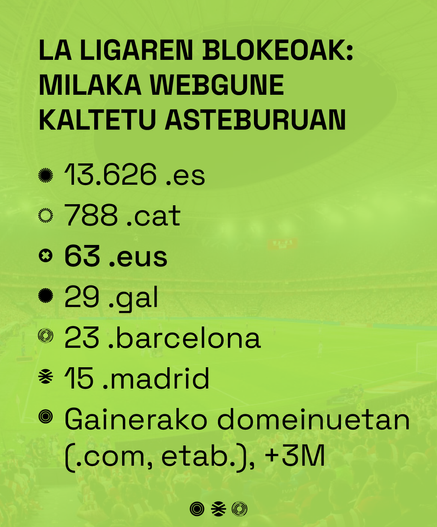Spain now has a law to voluntarily cut communications and electronic services
- A few days ago, the acting President of the Spanish Government, Pedro Sánchez, announced that the Executive will adopt a legislative decree and measures to put an end to the pretensions of the "Catalan Digital Republic". The Decree-Law has arrived immediately, the Government has proclaimed its functioning, without going through the Spanish parliamentary system, and it has been published today in the official BOE. Basically, the Government can urgently close any activity or electronic communication, on such broad pretexts as public order or economic damage.

Censorship measures are applied in practice in Spain with any excuse, as the case of the Democratic Tsunami demonstrates. But now, you don't even need a court order. The Government, even without the need to offer a hearing in the courts, will close what it wishes.
The facts have developed rapidly, apparently, because we have gone from an announcement last week to a full law decree in six days. Surely the PSOE Government was preparing it for a long time, that seems more logical.
According to the media, what the government intends to paralyse is "the Catalan Digital Republic", in reference to Catalonia. Of course, it doesn't exist. The Generalitat, for its part, announced in September a service called IdentiCat, which supposedly with Blockchain technology offered Catalan citizens a number of safe options to ensure safe management of identity and data in their relations with the administration. Apparently, it is something similar to what the Basque Government does with the Izenpe service, including some fashion terms (Blockchain, of course).
In order to paralyse this initiative by the Catalan Government, the following measure was announced last week: that a digital administrative service could not accommodate data abroad. This would supposedly deactivate IdentiCat (but it would also make it difficult to manage data from other institutions, because, it is said, the servers of the Spanish Ministry of the Interior are also abroad, for example). Finally, the decree states that the servers must be located in the European Union and that if any organisation has systems to secure its identity in other countries, they must be transferred to Europe within six months.
But constraint prediction goes beyond the server location account. Chapter 4 of the BOE Decree announces a control system similar to that of China. The Government may suspend any electronic network or communication:
The Government, on an exceptional and transitional basis, assuming by the General Administration of the Law the direct management or intervention of the existing communications networks and services in terms of public security and national security. In particular, this exceptional and exceptional power of direct or voluntary management may be necessary, infrastructure, resource or element or level of the network or service it needs to use to do so, to restore public order and national security.
It will be the responsibility of the Ministry of Economy and Business this ability to close anything and will apply to this vast collection of cases.
(a) Where there is an immediate and serious threat to public order, public security or national security.
(b) Where there is an immediate and serious threat to public health.
(c) Where the infringing activity involves active damage to the functioning of the public security, civil protection and emergency service.
(d) When other communications services or networks are seriously interfered with.
(e) When it creates serious economic or operational problems for others or communications networks or services, or for the remainder of the radio spectrum user.’
And all of this with what excuse? Because serious things are supposed to have happened. The introduction of the decree states:
Recent and serious developments in part of the Spanish territory have highlighted the need to amend the existing legislative framework to deal with the situation.
Somewhere, people have used the Internet, Telegram or I don't know what, to make demonstrations, and in those demonstrations there have been several fires. Consequently, by order of the Ministry of Economy, any electronic communication in Spain will be allowed to be closed. A picture.
A critical reading of what was approved today in Spain, with the help of the Civio organization.
Azken aldian, asteburuetan, Internet ez dabil ondo. Hasieran, zaila zen webguneei ezarritako blokeoen zergatia ulertzea; orain, badakigu Espainiako La Ligak agindu zituela, futbola modu ilegalean emititzea saihesteko. La Ligaren blokeoak euskal domeinuei eragiten dien... [+]























